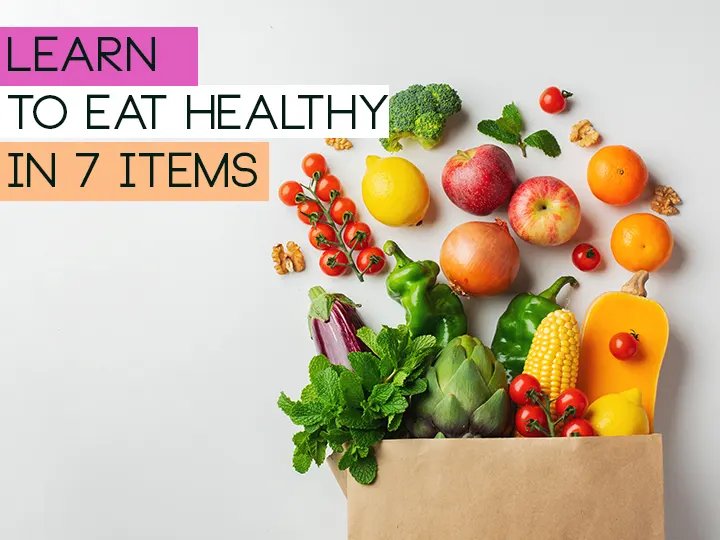
1
Eat 225-325 grams (1-2.5 cups) of complex carbohydrates each day. Complex carbohydrates are digested and absorbed slowly by the body, so they contain more nutrients and keep you full for longer. It's a good idea to consume complex carbohydrates such as whole grain wheat, sweet potatoes, oats and/or brown rice. These healthy carbohydrates often contain more vitamins and nutrients than simple carbohydrates such as white bread and white rice.[1]
Choose wholemeal bread, multigrain bread or rye bread and whole grain pasta.
If you like oats for breakfast, choose whole-grain oats.
Depending on your personal needs, your doctor may recommend that you consume less carbohydrates.
2
Fill at least half of your plate with vegetables to eat 5 servings of vegetables a day. Vegetables are packed with nutrients and surprisingly easy to incorporate into your diet. Eat dark green leafy vegetables like kale, mustard leaves, and chard. Make a simple sauté with olive oil, garlic and some salt and pepper; it will be a surprisingly delicious and nutritious dish.[2]
If you add spinach to your morning smoothie, you'll have a serving of leafy greens before you even realize it.
The next time you make tacos, try tossing in some peppers and onions.
Pasta dishes are great for adding extra vegetables. Add some mushrooms to your spaghetti or lasagna.
Don't be afraid to try new foods. If you think you don't like vegetables, try another type.
3
Eat 2-3 servings of fruit each day for extra vitamins. Vegetables are good for you and can be a delicious snack. You can have an apple or pear as a mid-morning snack, or you can look for ways to incorporate fruit into other meals.[3]
Add berries or a banana to your morning cereal or oatmeal.
Fresh fruits go well with salads. Try adding some dried tuna to add flavor to the salad, or top a leafy green salad with a pear and goat cheese.
4
Eat healthy, lean proteins for more energy. Protein helps build muscle and provides you with sustained energy throughout the day. Choose lean proteins to avoid adding too much fat to your diet. There are great options that include meat and plant-based proteins. Controversy continues about how much protein you need each day, so consult your doctor or use an online calculator for specific amounts. Examples of healthy proteins include:[4]
Lean white and red meats
Fish such as salmon, white-fleshed fish, and tuna
Nuts like cashews, almonds, and pistachios
Beans such as black beans, kidney beans, and white beans
Lentils and chickpeas
5
Choose healthy fats for 20-35% of your daily calories. For your body to function properly, you need to consume fat. But it is important to choose the right kind of oils. Read food labels and choose foods that are low in saturated fats. Normally, you should aim to eat less than 20-30 grams of saturated fat each day. Choose foods like avocado, salmon, tuna, and nut butters to get the healthy fats you need.[5]
Monounsaturated fats and omega-3 fatty acids are good fats that you should consume regularly. These fats help lower the "bad cholesterol" by raising the "good cholesterol" in your body.
Foods rich in fatty acids are olive oil, nuts, fish oil and various seed oils. Incorporating these "good" fats into your weekly diet can lower your cholesterol and reduce your risk of heart disease.
Stay away from trans fats and saturated fats. Trans fats, also known as hydrogenated fats, are a type of unsaturated fat found mostly in processed foods. Consuming them increases the risk of heart disease.
6
Reduce your salt intake to reduce sodium. A small amount of sodium is good for you, and you can get enough sodium just by eating healthy. Avoid adding salt after meal preparation and stay away from packaged foods that can contain a lot of extra sodium.[6]
Instead of seasoning foods with salt, consider adding fresh herbs like chives, fresh coriander or dill.
Canned vegetables can contain a lot of sodium, so buy fresh or frozen whenever possible.
Ask your doctor about the amount of salt you can take. If you have high blood pressure or heart problems, you may need to reduce your salt intake even more.
7
Drink at least 11.5 glasses (2.7 L) of water each day. Water is essential for good health, so make sure to drink at least 11.5 glasses (2.7 L) of water a day if you're a woman, and 15.5 glasses (3.7 L) if you're a man. Try tracking how much you drink to know if you're drinking enough water. Get a water bottle that is clearly marked so it's easy to measure. Another good idea is to drink water before you're thirsty. This will help ensure you don't get dehydrated.[7]
Carry water with you so you can easily drink when thirsty.
If you do a hard workout or spend time outside on a hot day, be sure to replenish your tanks by drinking extra water that day.